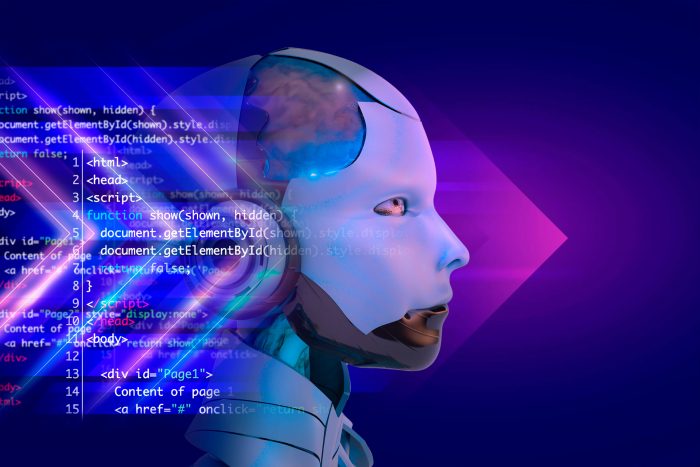Artificial intelligence (AI) has become a hot topic in the world of web development. With advancements in machine learning and natural language processing, AI has the potential to revolutionize the way websites are designed and developed. In this blog post, we’ll take a closer look at the role of AI in web development and explore some of the most exciting applications and trends in this field.
What is AI?
It is encompassed in the area of informatics that deals with the creation of intelligent machines that are developed to function and emulate a real human being. Some of these human-like activities include learning, understanding, speech recognition, and problem solving. Furthermore, AI is the ability of a machine or computer program to learn and think. It can be said that the main objective of this is to try to make information systems intelligent.
Why is AI important?
A system is said to be endowed with Artificial Intelligence when it is specifically designed so that it thinks and acts just like a human being. Increasingly, Artificial Intelligence is becoming a crucial part of our daily lives. Our lives are being changed by Artificial Intelligence because this technology is used widely in different areas in our daily lives.
Why is AI important?
There are several reasons why implementing AI (Artificial Intelligence) in web development can be beneficial, namely:
- Improving user experience (UX): AI-nurtured websites can offer personalized experiences to users based on their preferences and behavior, leading to greater engagement and consequently higher satisfaction.
- Automation: AI can automate routine tasks such as data entry, content optimisation, and customer service, freeing up time for developers to focus on tasks with greater importance.
- Better data analysis: AI can process diverse amounts of data quickly and accurately, providing valuable insights into user behavior and website performance.
- Greater Security: AI can be used to detect and prevent cyber attacks, protecting websites and their users from possible threats.
- Competitive Advantage: Websites that incorporate AI can stand out from competitors due to a few reasons listed above, as they can provide innovative and cutting-edge features.
Some trends and most used applications in this field
- Chatbots: Chatbots are one of the most well-known applications of AI in web development. They can be integrated into websites or mobile apps to provide customers with 24/7 support and assist with common tasks, such as placing an order, answering FAQs, and providing product recommendations.
- Personalization: AI can be used to personalize the user experience on websites and mobile apps. For example, AI algorithms can analyze user behavior and preferences to provide personalized content, recommendations, and advertising. This can improve user engagement and increase conversion rates.
- Voice and Gesture Interfaces: AI-powered voice and gesture interfaces are becoming increasingly popular, especially with the growth of smart speakers and wearables. This technology enables users to interact with websites and apps using voice commands and gestures, making it easier to perform tasks and access information.
- Predictive Analytics: AI can also be used for predictive analytics, allowing web developers to analyze data and make informed decisions about the future. For example, AI algorithms can analyze user behavior and predict future customer needs, enabling businesses to offer personalized experiences and improve their customer service.
- Image and Video Recognition: AI can be used to add image and video recognition capabilities to websites and apps. For example, AI algorithms can be trained to recognize specific objects in images and videos, allowing users to search for specific content and make selections based on visual data.
Advantages and Disadvantages
Advantages
- Efficiency: AI can automate routine tasks, such as testing and content generation, and reduce development time, making the process much more efficient.
- Personalisation: AI has the ability to analyze user data to provide personalized experiences and recommendations, which can improve user satisfaction and engagement.
- Cost reduction: By automating tasks, AI can reduce labor costs and increase productivity, saving businesses money.
- Predictive analytics: AI can examine data to make predictions about user behavior and trends, which can inform and consequently influence development decisions.
- Image and Video Recognition: AI can be used to add image and video recognition capabilities to websites and apps. For example, AI algorithms can be trained to recognize specific objects in images and videos, allowing users to search for specific content and make selections based on visual data.
Disadvantages
- Complexity: AI algorithms can have a large degree of complexity and require specialized skills, making it difficult to integrate them into existing systems.
- Security Risks: AI systems can be vulnerable to hacking and cyber attacks, which could expose sensitive user data.
- Ethical Concerns: AI can be used to manipulate user data or behavior, raising ethical concerns around data privacy, including user autonomy itself.
- Cost: Implementing AI can be costly, requiring hardware, software and staff specialized in the same.
- Lack of human interaction: AI-powered chatbots and virtual assistants typically lack the personal touch/reaction and empathy that human support staff can provide, leading to lower user satisfaction.
Artificial intelligence is poised to play a major role in the future of web development. With its ability to provide personalized experiences, improve customer service, and analyze data, AI has the potential to transform the way websites and apps are designed and developed. As the technology continues to advance, it will be exciting to see how AI will continue to shape the future of web development.
